英语成语故事:指鹿为马
- 格式:doc
- 大小:22.00 KB
- 文档页数:1
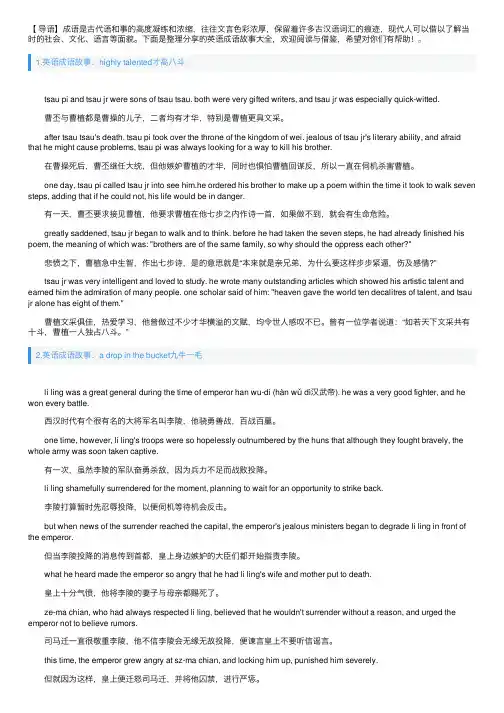
【导语】成语是古代语和事的⾼度凝练和浓缩,往往⽂⾔⾊彩浓厚,保留着许多古汉语词汇的痕迹,现代⼈可以借以了解当时的社会、⽂化、语⾔等⾯貌。
下⾯是整理分享的英语成语故事⼤全,欢迎阅读与借鉴,希望对你们有帮助!1.英语成语故事:highly talented才⾼⼋⽃tsau pi and tsau jr were sons of tsau tsau. both were very gifted writers, and tsau jr was especially quick-witted.曹丕与曹植都是曹操的⼉⼦,⼆者均有才华,特别是曹植更具⽂采。
after tsau tsau's death, tsau pi took over the throne of the kingdom of wei. jealous of tsau jr's literary ability, and afraid that he might cause problems, tsau pi was always looking for a way to kill his brother.在曹操死后,曹丕继任⼤统,但他嫉妒曹植的才华,同时也惧怕曹植回谋反,所以⼀直在伺机杀害曹植。
one day, tsau pi called tsau jr into see him.he ordered his brother to make up a poem within the time it took to walk seven steps, adding that if he could not, his life would be in danger.有⼀天,曹丕要求接见曹植,他要求曹植在他七步之内作诗⼀⾸,如果做不到,就会有⽣命危险。
greatly saddened, tsau jr began to walk and to think. before he had taken the seven steps, he had already finished his poem, the meaning of which was: "brothers are of the same family, so why should the oppress each other?"悲愤之下,曹植急中⽣智,作出七步诗,是的意思就是“本来就是亲兄弟,为什么要这样步步紧逼,伤及感情?”tsau jr was very intelligent and loved to study. he wrote many outstanding articles which showed his artistic talent and earned him the admiration of many people. one scholar said of him: "heaven gave the world ten decalitres of talent, and tsau jr alone has eight of them."曹植⽂采俱佳,热爱学习,他曾做过不少才华横溢的⽂赋,均令世⼈感叹不已。
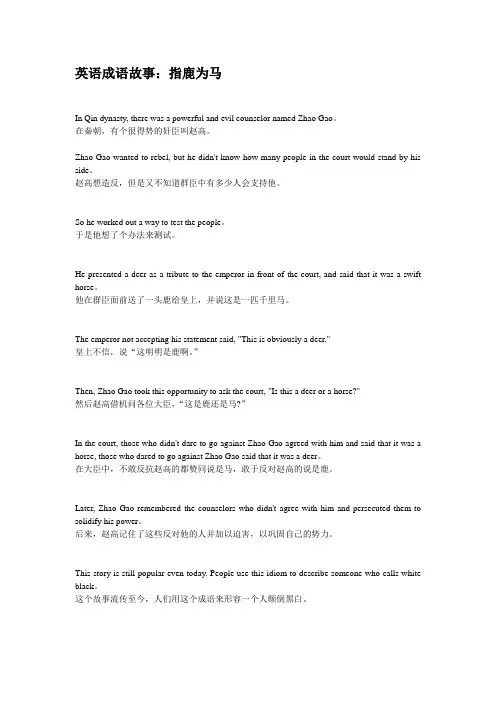
英语成语故事:指鹿为马In Qin dynasty, there was a powerful and evil counselor named Zhao Gao。
在秦朝,有个很得势的奸臣叫赵高。
Zhao Gao wanted to rebel, but he didn't know how many people in the court would stand by his side。
赵高想造反,但是又不知道群臣中有多少人会支持他。
So he worked out a way to test the people。
于是他想了个办法来测试。
He presented a deer as a tribute to the emperor in front of the court, and said that it was a swift horse。
他在群臣面前送了一头鹿给皇上,并说这是一匹千里马。
The emperor not accepting his statement said, "This is obviously a deer."皇上不信,说“这明明是鹿啊。
”Then, Zhao Gao took this opportunity to ask the court, "Is this a deer or a horse?"然后赵高借机问各位大臣,“这是鹿还是马?”In the court, those who didn't dare to go against Zhao Gao agreed with him and said that it was a horse, those who dared to go against Zhao Gao said that it was a deer。
在大臣中,不敢反抗赵高的都赞同说是马,敢于反对赵高的说是鹿。
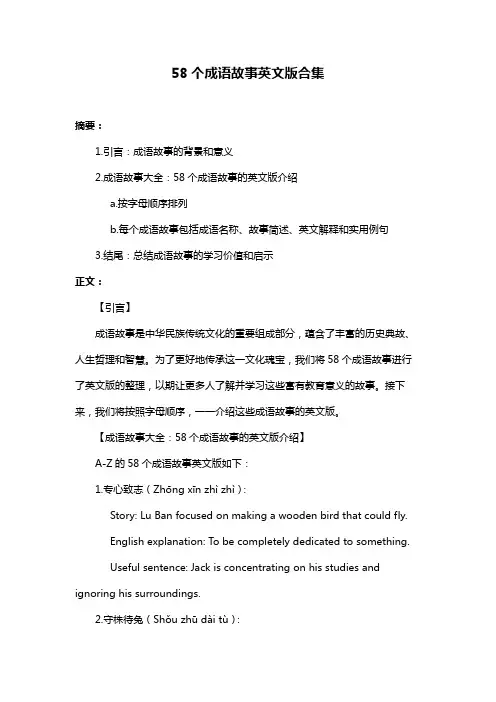
58个成语故事英文版合集摘要:1.引言:成语故事的背景和意义2.成语故事大全:58个成语故事的英文版介绍a.按字母顺序排列b.每个成语故事包括成语名称、故事简述、英文解释和实用例句3.结尾:总结成语故事的学习价值和启示正文:【引言】成语故事是中华民族传统文化的重要组成部分,蕴含了丰富的历史典故、人生哲理和智慧。
为了更好地传承这一文化瑰宝,我们将58个成语故事进行了英文版的整理,以期让更多人了解并学习这些富有教育意义的故事。
接下来,我们将按照字母顺序,一一介绍这些成语故事的英文版。
【成语故事大全:58个成语故事的英文版介绍】A-Z的58个成语故事英文版如下:1.专心致志(Zhōng xīn zhì zhì):Story: Lu Ban focused on making a wooden bird that could fly.English explanation: To be completely dedicated to something.Useful sentence: Jack is concentrating on his studies and ignoring his surroundings.2.守株待兔(Shǒu zhū dài tù):Story: A farmer waited for turtles to hatch instead of working.English explanation: To rely on luck instead of effort.Useful sentence: Peter is waiting for a promotion instead of working hard for it....49.亡羊补牢(Wáng yáng bǔ láo):Story: A shepherd repaired his fence after losing a goat to a wolf.English explanation: To take action to fix a problem after it occurs.Useful sentence: The company realized the importance of cybersecurity after a data breach.50.卧薪尝胆(Wò xīn cháng jiǎn):Story: King Zhou of the Shang Dynasty endured hardships to avenge his defeat.English explanation: To endure hardships and persevere until success.Useful sentence: T om has been working tirelessly to achieve his dream of becoming a professional athlete....58.自强不息(Zì qiáng bù xī):Story: Huawei"s founder, Ren Zhengfei, worked hard to establish the company.English explanation: To strive for self-improvement without stopping.Useful sentence:玛丽努力学习,为实现自己的梦想不懈努力。
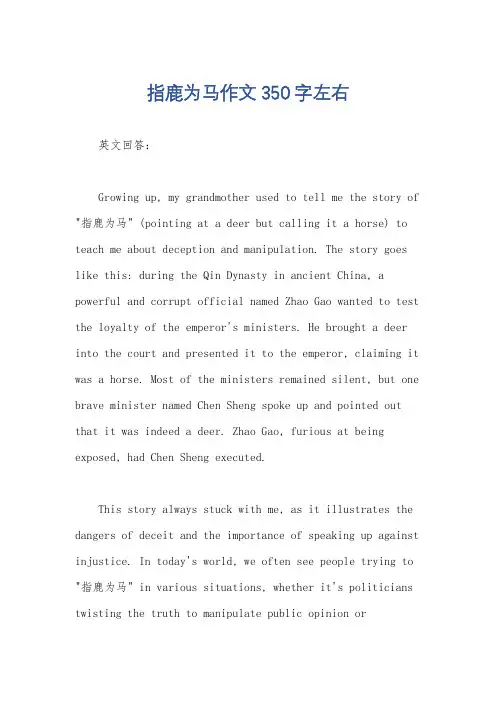
指鹿为马作文350字左右英文回答:Growing up, my grandmother used to tell me the story of "指鹿为马" (pointing at a deer but calling it a horse) to teach me about deception and manipulation. The story goes like this: during the Qin Dynasty in ancient China, a powerful and corrupt official named Zhao Gao wanted to test the loyalty of the emperor's ministers. He brought a deer into the court and presented it to the emperor, claiming it was a horse. Most of the ministers remained silent, but one brave minister named Chen Sheng spoke up and pointed out that it was indeed a deer. Zhao Gao, furious at being exposed, had Chen Sheng executed.This story always stuck with me, as it illustrates the dangers of deceit and the importance of speaking up against injustice. In today's world, we often see people trying to "指鹿为马" in various situations, whether it's politicians twisting the truth to manipulate public opinion orcompanies using misleading advertising to deceive consumers. It's crucial to be vigilant and not allow ourselves to be fooled by those who try to deceive us.中文回答:小时候,我奶奶经常讲一个关于“指鹿为马”的故事,来教育我如何识破欺骗和操纵。
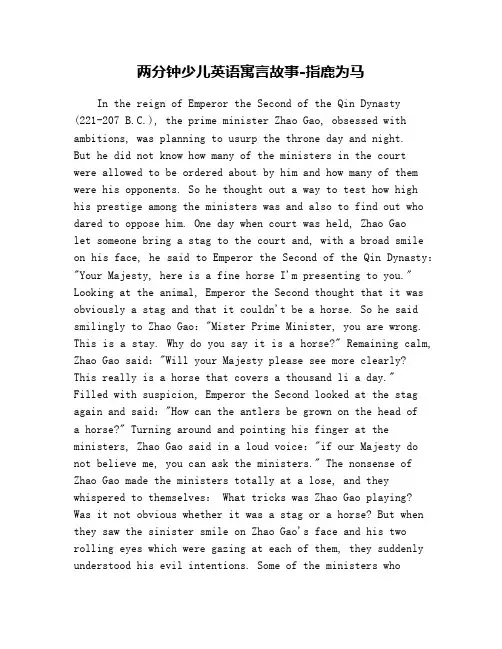
两分钟少儿英语寓言故事-指鹿为马In the reign of Emperor the Second of the Qin Dynasty (221-207 B.C.), the prime minister Zhao Gao, obsessed with ambitions, was planning to usurp the throne day and night.But he did not know how many of the ministers in the court were allowed to be ordered about by him and how many of them were his opponents. So he thought out a way to test how high his prestige among the ministers was and also to find out who dared to oppose him. One day when court was held, Zhao Gaolet someone bring a stag to the court and, with a broad smile on his face, he said to Emperor the Second of the Qin Dynasty:"Your Majesty, here is a fine horse I'm presenting to you." Looking at the animal, Emperor the Second thought that it was obviously a stag and that it couldn't be a horse. So he said smilingly to Zhao Gao:"Mister Prime Minister, you are wrong. This is a stay. Why do you say it is a horse?" Remaining calm, Zhao Gao said:"Will your Majesty please see more clearly?This really is a horse that covers a thousand li a day."Filled with suspicion, Emperor the Second looked at the stag again and said:"How can the antlers be grown on the head ofa horse?" Turning around and pointing his finger at the ministers, Zhao Gao said in a loud voice:"if our Majesty do not believe me, you can ask the ministers." The nonsense of Zhao Gao made the ministers totally at a lose, and they whispered to themselves: What tricks was Zhao Gao playing? Was it not obvious whether it was a stag or a horse? But when they saw the sinister smile on Zhao Gao's face and his two rolling eyes which were gazing at each of them, they suddenly understood his evil intentions. Some of the ministers whowere timid and yet had a sense of right eousness did not dare to say anything, because to tell lies would make their conscience uneasy and to tell the truth would mean that they would be persecuted by Zhao Gao later. Some ministers with a sense of justice persisted that it was a stag and not a horse. There were still some crafty and fawning ministers whofollowed Zhao Gao closely in ordinary times. They immediately voiced their support to Zhao Gao, saying to the emperor:"This really in a horse that covers a thousand li a day."After the event, Zhao Gao punished by various means those ministers with a sense of justice who were not obedient to him, even with whole families of some of those ministers executed. This story appears in "The Life of the First Emperor of the Qin Dynasty" in The Historical Records written by Sima Qian. From this story people have derived the set phrase "calling a stag a horse" to mean deliberately misrepresenting some thing and misleading the public.秦二世时,丞相赵高野心勃勃,日夜盘算着要篡夺皇位。
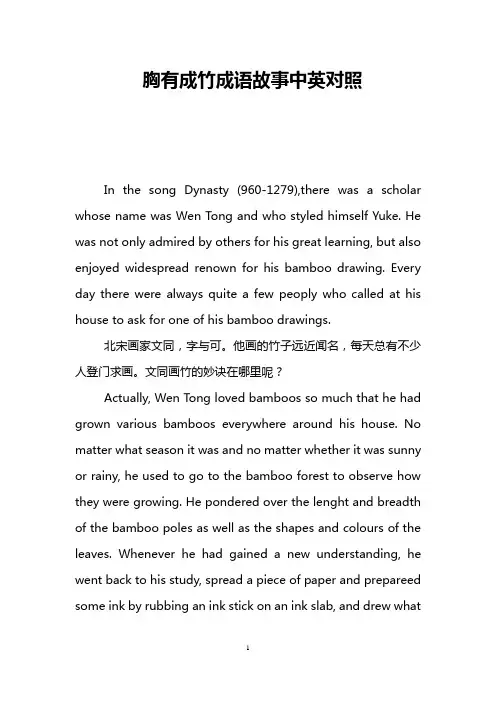
胸有成竹成语故事中英对照In the song Dynasty (960-1279),there was a scholar whose name was Wen Tong and who styled himself Yuke. He was not only admired by others for his great learning, but also enjoyed widespread renown for his bamboo drawing. Every day there were always quite a few peoply who called at his house to ask for one of his bamboo drawings.北宋画家文同,字与可。
他画的竹子远近闻名,每天总有不少人登门求画。
文同画竹的妙诀在哪里呢?Actually, Wen Tong loved bamboos so much that he had grown various bamboos everywhere around his house. No matter what season it was and no matter whether it was sunny or rainy, he used to go to the bamboo forest to observe how they were growing. He pondered over the lenght and breadth of the bamboo poles as well as the shapes and colours of the leaves. Whenever he had gained a new understanding, he went back to his study, spread a piece of paper and prepareed some ink by rubbing an ink stick on an ink slab, and drew whatwas in his mind on the paper. Through accumulation over a long period of time, the images of the bamboo in different seasons, under different weather conditions and at different moments were deeply imprinted in his mind.So whenever he stood before the paper and picked up a painting brush with concentrated attention, the various forms of the bamboo which he had observed at ordinary times at once rose before his eyes. And so every time he was drawing bamboos he appeared confident and at ease, and all the bamboos he had painted were very vivid and true to lift.原来,文同在自己家的房前屋后种上各种样的竹子,无论春夏秋冬,阴睛风雨,他经常去竹林观察竹子的生长变化情况,琢磨竹枝的长短粗细,叶子的形态、颜色,每当有新的感受就回到书房,铺纸研墨,把心中的印象画在纸上。
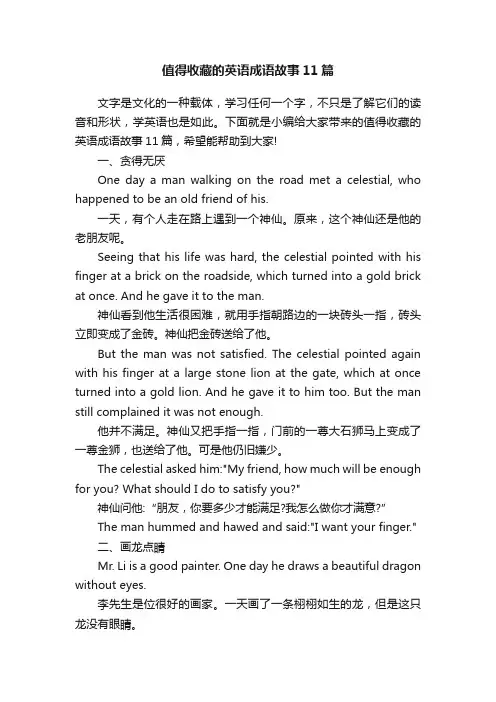
值得收藏的英语成语故事11篇文字是文化的一种载体,学习任何一个字,不只是了解它们的读音和形状,学英语也是如此。
下面就是小编给大家带来的值得收藏的英语成语故事11篇,希望能帮助到大家!一、贪得无厌One day a man walking on the road met a celestial, who happened to be an old friend of his.一天,有个人走在路上遇到一个神仙。
原来,这个神仙还是他的老朋友呢。
Seeing that his life was hard, the celestial pointed with his finger at a brick on the roadside, which turned into a gold brick at once. And he gave it to the man.神仙看到他生活很困难,就用手指朝路边的一块砖头一指,砖头立即变成了金砖。
神仙把金砖送给了他。
But the man was not satisfied. The celestial pointed again with his finger at a large stone lion at the gate, which at once turned into a gold lion. And he gave it to him too. But the man still complained it was not enough.他并不满足。
神仙又把手指一指,门前的一尊大石狮马上变成了一尊金狮,也送给了他。
可是他仍旧嫌少。
The celestial asked him:"My friend, how much will be enough for you? What should I do to satisfy you?"神仙问他:“朋友,你要多少才能满足?我怎么做你才满意?”The man hummed and hawed and said:"I want your finger."二、画龙点睛Mr. Li is a good painter. One day he draws a beautiful dragon without eyes.李先生是位很好的画家。
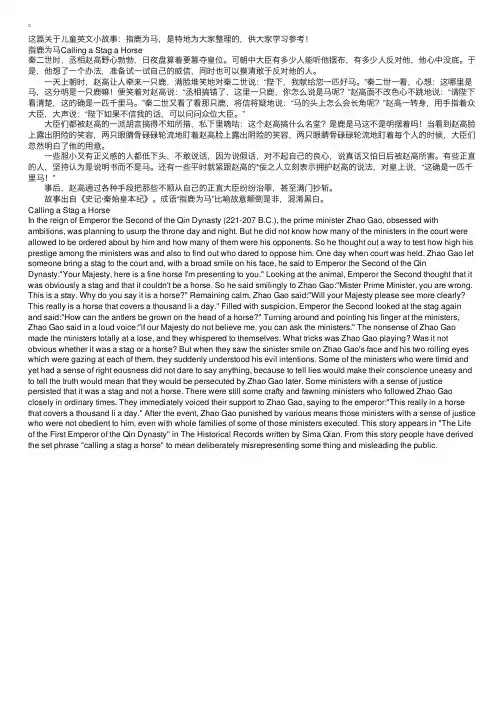
这篇关于⼉童英⽂⼩故事:指⿅为马,是特地为⼤家整理的,供⼤家学习参考!指⿅为马Calling a Stag a Horse秦⼆世时,丞相赵⾼野⼼勃勃,⽇夜盘算着要篡夺皇位。
可朝中⼤⾂有多少⼈能听他摆布,有多少⼈反对他,他⼼中没底。
于是,他想了⼀个办法,准备试⼀试⾃⼰的威信,同时也可以摸清敢于反对他的⼈。
⼀天上朝时,赵⾼让⼈牵来⼀只⿅,满脸堆笑地对秦⼆世说:“陛下,我献给您⼀匹好马。
”秦⼆世⼀看,⼼想:这哪⾥是马,这分明是⼀只⿅嘛!便笑着对赵⾼说:“丞相搞错了,这⾥⼀只⿅,你怎么说是马呢?”赵⾼⾯不改⾊⼼不跳地说:“请陛下看清楚,这的确是⼀匹千⾥马。
”秦⼆世⼜看了看那只⿅,将信将疑地说:“马的头上怎么会长⾓呢?”赵⾼⼀转⾝,⽤⼿指着众⼤⾂,⼤声说:“陛下如果不信我的话,可以问问众位⼤⾂。
” ⼤⾂们都被赵⾼的⼀派胡⾔搞得不知所措,私下⾥嘀咕:这个赵⾼搞什么名堂?是⿅是马这不是明摆着吗!当看到赵⾼脸上露出阴险的笑容,两只眼睛⾻碌碌轮流地盯着赵⾼脸上露出阴险的笑容,两只眼睛⾻碌碌轮流地盯着每个⼈的时候,⼤⾂们忽然明⽩了他的⽤意。
⼀些胆⼩⼜有正义感的⼈都低下头,不敢说话,因为说假话,对不起⾃⼰的良⼼,说真话⼜怕⽇后被赵⾼所害。
有些正直的⼈,坚持认为是说明书⽽不是马。
还有⼀些平时就紧跟赵⾼的*佞之⼈⽴刻表⽰拥护赵⾼的说法,对皇上说,“这确是⼀匹千⾥马!” 事后,赵⾼通过各种⼿段把那些不顺从⾃⼰的正直⼤⾂纷纷治罪,甚⾄满门抄斩。
故事出⾃《史记·秦始皇本纪》。
成语“指⿅为马”⽐喻故意颠倒是⾮,混淆⿊⽩。
Calling a Stag a HorseIn the reign of Emperor the Second of the Qin Dynasty (221-207 B.C.), the prime minister Zhao Gao, obsessed with ambitions, was planning to usurp the throne day and night. But he did not know how many of the ministers in the court were allowed to be ordered about by him and how many of them were his opponents. So he thought out a way to test how high his prestige among the ministers was and also to find out who dared to oppose him. One day when court was held, Zhao Gao let someone bring a stag to the court and, with a broad smile on his face, he said to Emperor the Second of the Qin Dynasty:"Your Majesty, here is a fine horse I'm presenting to you." Looking at the animal, Emperor the Second thought that it was obviously a stag and that it couldn't be a horse. So he said smilingly to Zhao Gao:"Mister Prime Minister, you are wrong. This is a stay. Why do you say it is a horse?" Remaining calm, Zhao Gao said:"Will your Majesty please see more clearly? This really is a horse that covers a thousand li a day." Filled with suspicion, Emperor the Second looked at the stag again and said:"How can the antlers be grown on the head of a horse?" Turning around and pointing his finger at the ministers, Zhao Gao said in a loud voice:"if our Majesty do not believe me, you can ask the ministers." The nonsense of Zhao Gao made the ministers totally at a lose, and they whispered to themselves: What tricks was Zhao Gao playing? Was it not obvious whether it was a stag or a horse? But when they saw the sinister smile on Zhao Gao's face and his two rolling eyes which were gazing at each of them, they suddenly understood his evil intentions. Some of the ministers who were timid and yet had a sense of right eousness did not dare to say anything, because to tell lies would make their conscience uneasy and to tell the truth would mean that they would be persecuted by Zhao Gao later. Some ministers with a sense of justice persisted that it was a stag and not a horse. There were still some crafty and fawning ministers who followed Zhao Gao closely in ordinary times. They immediately voiced their support to Zhao Gao, saying to the emperor:"This really in a horse that covers a thousand li a day." After the event, Zhao Gao punished by various means those ministers with a sense of justice who were not obedient to him, even with whole families of some of those ministers executed. This story appears in "The Life of the First Emperor of the Qin Dynasty" in The Historical Records written by Sima Qian. From this story people have derived the set phrase "calling a stag a horse" to mean deliberately misrepresenting some thing and misleading the public.。
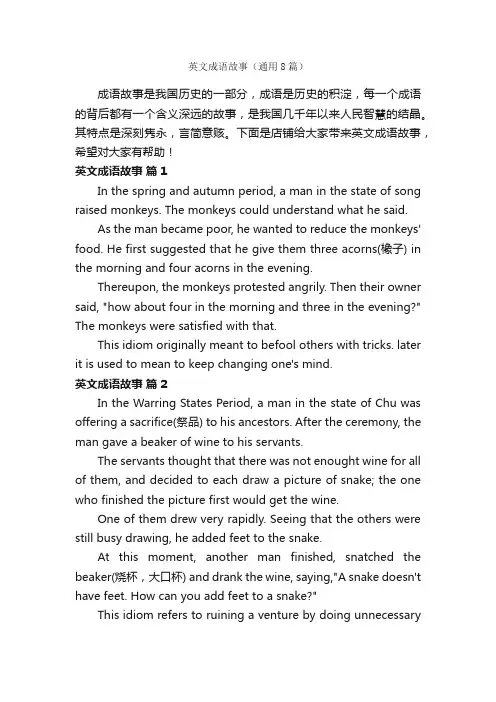
英文成语故事(通用8篇)成语故事是我国历史的一部分,成语是历史的积淀,每一个成语的背后都有一个含义深远的故事,是我国几千年以来人民智慧的结晶。
其特点是深刻隽永,言简意赅。
下面是店铺给大家带来英文成语故事,希望对大家有帮助!英文成语故事篇1In the spring and autumn period, a man in the state of song raised monkeys. The monkeys could understand what he said.As the man became poor, he wanted to reduce the monkeys' food. He first suggested that he give them three acorns(橡子) in the morning and four acorns in the evening.Thereupon, the monkeys protested angrily. Then their owner said, "how about four in the morning and three in the evening?" The monkeys were satisfied with that.This idiom originally meant to befool others with tricks. later it is used to mean to keep changing one's mind.英文成语故事篇2In the Warring States Period, a man in the state of Chu was offering a sacrifice(祭品) to his ancestors. After the ceremony, the man gave a beaker of wine to his servants.The servants thought that there was not enought wine for all of them, and decided to each draw a picture of snake; the one who finished the picture first would get the wine.One of them drew very rapidly. Seeing that the others were still busy drawing, he added feet to the snake.At this moment, another man finished, snatched the beaker(烧杯,大口杯) and drank the wine, saying,"A snake doesn't have feet. How can you add feet to a snake?"This idiom refers to ruining a venture by doing unnecessaryand surplus things.英文成语故事篇3In the Spring and Autumn Period, a farmer in the State of Song was one day working in the fields when he saw a rabbit bump into a tree stump(树桩) accidentally and break its neck.The farmer took the rabbit home, and cooked himself a delicious meal.That night he thought, 'I needn't work so hard. All I have to do is wait for a rabbit each day by the stump.'So from then on he gave up farming, and simply sat by the stump waiting for rabbits to come and run into it.This idiom satirizes(讽刺,挖苦) those who just wait for a stroke of luck, rather than making efforts to obtain what they need.英文成语故事篇4Near China's northern borders lived a man well versed in the practices of Taoism. His horse, for no reason at all, got into the territory of the northern tribes. Everyone commiserated with him."Perhaps this will soon turn out to be a blessing," said his father.After a few months, his animal came back, leading a fine horse from the north. Everyone congratulated him."Perhaps this will soon turn out to be a cause of misfortune," said his father.Since he was well-off and kept good horses his son became fond of riding and eventually broke his thigh bone falling from a horse. Everyone commiserated with him."Perhaps this will soon turn out to be a blessing," said his father.One year later, the northern tribes started a big invasion ofthe border regions. All able-bodied young men took up arms and fought against the invaders, and as a result, around the border nine out of ten men died. This man's son did not join in the fighting because he was crippled and so both the boy and his father survived.战国时期,靠近北部边城,住着一个老人,名叫塞翁。
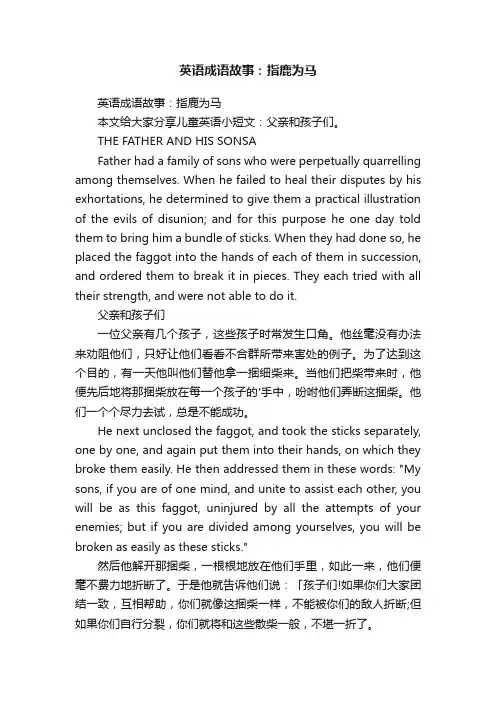
英语成语故事:指鹿为马英语成语故事:指鹿为马本文给大家分享儿童英语小短文:父亲和孩子们。
THE FATHER AND HIS SONSAFather had a family of sons who were perpetually quarrelling among themselves. When he failed to heal their disputes by his exhortations, he determined to give them a practical illustration of the evils of disunion; and for this purpose he one day told them to bring him a bundle of sticks. When they had done so, he placed the faggot into the hands of each of them in succession, and ordered them to break it in pieces. They each tried with all their strength, and were not able to do it.父亲和孩子们一位父亲有几个孩子,这些孩子时常发生口角。
他丝毫没有办法来劝阻他们,只好让他们看看不合群所带来害处的例子。
为了达到这个目的,有一天他叫他们替他拿一捆细柴来。
当他们把柴带来时,他便先后地将那捆柴放在每一个孩子的'手中,吩咐他们弄断这捆柴。
他们一个个尽力去试,总是不能成功。
He next unclosed the faggot, and took the sticks separately, one by one, and again put them into their hands, on which they broke them easily. He then addressed them in these words: "My sons, if you are of one mind, and unite to assist each other, you will be as this faggot, uninjured by all the attempts of your enemies; but if you are divided among yourselves, you will be broken as easily as these sticks."然后他解开那捆柴,一根根地放在他们手里,如此一来,他们便毫不费力地折断了。
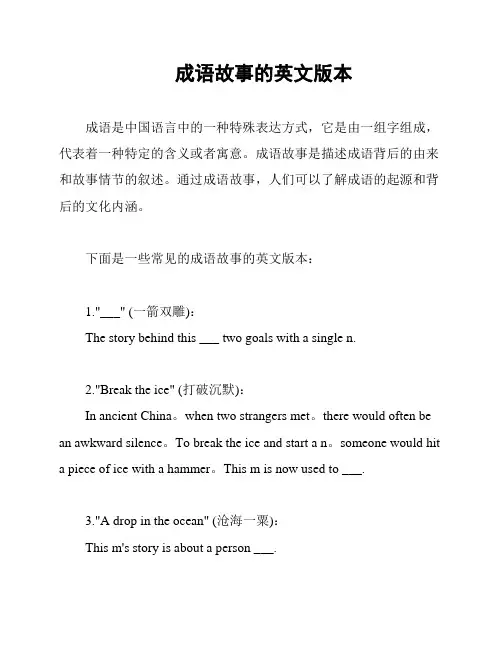
成语故事的英文版本成语是中国语言中的一种特殊表达方式,它是由一组字组成,代表着一种特定的含义或者寓意。
成语故事是描述成语背后的由来和故事情节的叙述。
通过成语故事,人们可以了解成语的起源和背后的文化内涵。
下面是一些常见的成语故事的英文版本:1."___" (一箭双雕):The story behind this ___ two goals with a single n.2."Break the ice" (打破沉默):In ancient China。
when two strangers met。
there would often be an awkward silence。
To break the ice and start a n。
someone would hit a piece of ice with a hammer。
This m is now used to ___.3."A drop in the ocean" (沧海一粟):This m's story is about a person ___.4."___" (尾大不掉):The story goes that a person was trying to catch a tiger by its tail。
which is the most dangerous part。
It ___.通过以上成语故事的英文版本,人们可以研究并理解这些成语的意义和用法。
同时也可以了解中国文化和历史故事背后的深层含义。
Note: ___ of the Chinese ms。
but they may not be exact ns as ms ___ introduce the general meaning and usage of the ___.。
英语成语故事简短的成语,是汉语中的一种特殊的语言现象,它具有数量庞大、言简意赅等特点,是汉民族语言和文化的瑰宝。
下面是店铺为您整理的英语成语故事简短的,希望对你有所帮助!英语成语故事简短的篇一:mere copycat东施效颦In the Spring and Autumn Period (春秋时期,770-476 BC), there was a beauty in the State of Yue called Xishi (西施).传说春秋时期,越国有一美女,名唤西施。
She often suffered from pains in her chest, and so she would often walk around doubled over and with her brows knitted.但是西施有心口疼的毛病,所以她经常手捂胸口,皱着眉头走着。
There was an ugly girl in the village called Dongshi who envied Xishi.村子里还住着一位丑姑娘,叫做东施,她十分嫉妒西施。
Striving to emulate Xishi, she imitated her stoop, knitting her brows at the same time.于是东施时常效仿西施,手捂胸口,紧皱眉头。
She thought that this made her elegant, but in fact, it only made her more ugly.东施觉得她效仿西施就会变得很美丽,但是实际上,只会使她变得更难看而已。
Later, this idiom came to be used to indicate improper imitation that produces the reverse effect.这个典故比喻不恰当的模仿,带来相反的效果。
英文成语故事附翻译英文成语故事附翻译(通用13篇)故事是一种文学体裁,生动的,美妙的故事可以帮你认识社会、理解人生,引导你做一个通达事理、明辨是非的人。
下面是小编帮大家整理的英文成语故事附翻译,供大家参考借鉴,希望可以帮助到你。
英文成语故事附翻译篇1During the Spring and Autumn Period (770-476 BC), prince Zhou Xu of the State of Wei killed his brother and became the new emperor. Zhou Xu was a tyrant. He oppressed his people and indulged in wars of agGREssion. By launching wars, he tried to divert the peoples attention and reduce their discontent with him in order to consolidate his dictatorship.The Duke of the State of Lu leant about Zhou Xus usurpation of state power and his ambitious plan, he asked a senior official, "What do you think about Zhou Xus move? "The official answered, "He indulges in wars , bringing his people much disaster. He wont get their support. And hes capricious, so few of his close friends follow him. He can never achieve his success. In addition, war is like fire. If one launches wars endlessly without restraint, hell eventually burn himself. "Sure enough, the people of Wei with the help of the State of Chen overthrew Zhou Xu and killed him in less than a year.Later, people use it to mean that those who do evil will finally ruin themselves.春秋时期,卫国的王子州吁杀死了他的哥哥卫桓公,成为了卫国的国君。
指鹿为马成语故事(最新版)编制人:__________________审核人:__________________审批人:__________________编制单位:__________________编制时间:____年____月____日序言下载提示:该文档是本店铺精心编制而成的,希望大家下载后,能够帮助大家解决实际问题。
文档下载后可定制修改,请根据实际需要进行调整和使用,谢谢!并且,本店铺为大家提供各种类型的经典范文,如工作计划、演讲稿、策划方案、合同协议、条据书信、学习资料、教学资料、好词好句、作文大全、其他范文等等,想了解不同范文格式和写法,敬请关注!Download tips: This document is carefully compiled by this editor.I hope that after you download it, it can help you solve practical problems. The document can be customized and modified after downloading, please adjust and use it according to actual needs, thank you!In addition, this shop provides you with various types of classic model essays, such as work plans, speech drafts, planning plans, contract agreements, letter of agreement, learning materials, teaching materials, good words and sentences, essays, other sample essays, etc.To learn about the format and writing of different sample essays, stay tuned!指鹿为马成语故事指鹿为马成语故事指鹿为马成语故事1【成语】:指鹿为马【拼音】:zhǐ lù wéi mǎ【解释】:指着鹿,说是马。
指鹿为马英文作文Title: "Deception Unmasked: The Tale of the Deer and the Horse"In ancient China, during the tumultuous times of the Qin dynasty, there arose a notorious incident known as the "Deer and the Horse" that has left an indelible mark on history. This tale, steeped in political intrigue and moral ambiguity, serves as a poignant reminder of the consequences of deceit and manipulation.At the heart of this saga lies the Machiavelliantactics employed by Zhao Gao, a cunning and treacherous chancellor serving under the tyrant Emperor Qin Shi Huang. Fearing for his own safety and seeking to consolidate his power, Zhao Gao devised a plan that would test the loyalty and discernment of the emperor's courtiers.One fateful day, Zhao Gao entered the imperial court leading a deer, but he boldly proclaimed it to be a horse.To his surprise, most of the courtiers remained silent, unwilling to challenge the chancellor's authority or risk incurring his wrath. However, one brave official, named Zhang Liang, dared to speak out against this blatant falsehood.In a display of unwavering integrity, Zhang Liang confronted Zhao Gao, declaring, "That is not a horse, but a deer!" Yet, Zhao Gao, unfazed by the accusation, sought to undermine Zhang Liang's credibility by questioning the perception of reality itself. He cunningly manipulated the situation, attempting to coerce others into believing his version of the truth.Despite Zhao Gao's machinations, Zhang Liang refused to back down, steadfast in his commitment to honesty and justice. His courageous stance resonated with those who witnessed the spectacle, inspiring admiration and respect for his moral fortitude in the face of adversity.Ultimately, the "Deer and the Horse" incident serves as a cautionary tale about the dangers of moral relativism andthe importance of upholding principles of truth and integrity, even in the most challenging circumstances. In a world fraught with deception and deceit, it is individuals like Zhang Liang who serve as beacons of light, guiding us towards a path of righteousness and moral clarity.As we reflect on this timeless parable, let us remember the words of Confucius, who once said, "The superior man understands what is right; the inferior man understands what will sell." May we strive to emulate the virtue and wisdom of those who, like Zhang Liang, have the courage to speak truth to power, even when it requires challenging the status quo. For it is through such acts of moral courage that we pave the way for a brighter and more just futurefor all.。
英⽂成语故事5篇精选_最新英⽂成语故事中英⽂版成语是语⾔中的精华,是由中华⽂化铸造的,英⽂成语故事可以帮助⼩朋友学习英⽂,提升学习英⽂的兴趣。
下⾯给⼤家带来⼀些关于英⽂成语故事5篇精选,供⼤家参考。
英⽂成语故事1探骊得珠很久很久以前,有⼀户⼈家住在黄河边上,靠割芦苇、编帘⼦簸箕为⽣,⽇⼦过得⾮常贫困。
有⼀天,⼉⼦在河边割芦苇,烈⽇当空,晒得他头昏眼花,于是他就坐下来休息。
他望着眼前的河⽔在阳光下闪耀着粼粼波光,想起⽗亲说过,在河的最深处有许多珍宝,可是谁也不敢去,因为那⾥住着⼀条凶猛的⿊龙叫骊龙,他想,要是潜到河底,找到珍宝,我们⼀家⼈就⽤不着像现在这样⼀天⼲到晚,三顿还吃不饱,不如豁出去试⼀试。
他把⼼⼀横,三下两下脱了⾐服,⼀头扎进冰冷的河⾥。
开始他还看得见四周的⼩鱼在游来游去,再往深处,光线变得越来越暗,⽔也越来越凉,最后,他什么都看不见了,四周⼀团漆⿊。
他⼼⾥有点害怕,不知该往哪⼉游。
就在这时,不远处有⼀个圆圆的物体在闪闪发光,定睛细看,啊,原来是明珠!他憋⾜⼀⼝⽓游过去,双⼿抱住明珠,使劲⼀拽,明珠就到了他怀⾥。
他迅速浮出⽔⾯,上岸后撒腿就往家跑。
⽗亲⼀见明珠,就问他是从哪⼉得到的。
他把经过⼀五⼀⼗地向⽗亲讲述⼀遍。
⽗亲听了说:“好险哪!这颗价值千⾦的明珠是长在⿊龙下巴底下的,你摘它的时候⿊龙必定是睡着了。
它要是醒着,你可就没命了。
”故事见于《庄⼦列御寇》。
成语“探骊得珠”,⽐喻写⽂章能紧扣主题,抓住要点。
groping about the chin of the black dragon to get a pearl-bringing out the bestlong,long age,there lived a family by the yellow river.they lived a very poor lift,depending on cutting reeds,weaving hanging screens and dustpans for a livelihood.one day,the son was cutting reeds by the riverside.with the scroching sun directly overhead,his head was swimming,so he sat down to take a rest.looking at the river water in front which was his father had once told him.in the depths of the river there were a lot rare treasures,but nobody dared to get them because a fierce black dragon was residing there.he thought that,if he could dive into the depts of the river and get the treasures,the whole family would mot have to toil from morning till night and yet could mot have enough to eat as now.he thought it would be better to have a try,and he was resolved to try in desperation.so he took off his clothes nimbly and dived into the cold water with a splash.at first,he could see small fish here and there all around.however,the deeper he dived ,the darker it became,and the colder the river water.at last,it was pitch-dark all around,and he could see nothing.he became frightened,and was at a loss where he should swim to.just at that time,he noticed a round object which was glittering not far away.he fixed his eyes on it,and saw it was a bright pearl.he held his breath and swam over there,held the pearl with both hands,pulled it with a great effort,and the bright pearl come into his arms.he came out from the water immediately,climbed up the bank,and made off for home at once.his father saw the bright pearl,and asked where he had got it.he told his father the whole story exactly as it had happened.hearing this,his father said repeatedly,"how dangerous it was!this precious pearl was grown on the chin of the black dragon.the black must have been sleeping when you were pulling the pearl.if the black dragon were awake,you would be dead."when the son heard this,he considered himself very lucky indeed.this story appears in the works of zhuang zi.from this story,later generations have derived the set phrase "groping about the chin of the black dragon to get a pearl-- bringing out the best" to indicate that an article is to the point.英⽂成语故事2桃李不⾔,下⾃成蹊西汉时候,有⼀位勇猛善战的将军,名叫李⼴,⼀⽣跟匈奴打过七⼗多次仗,战功卓著,深受官兵和百姓的爱戴。
【导语】成语是古代语和事的⾼度凝练和浓缩,往往⽂⾔⾊彩浓厚,保留着许多古汉语词汇的痕迹,现代⼈可以借以了解当时的社会、⽂化、语⾔等⾯貌。
下⾯是®⽆忧考⽹整理分享的英语成语故事⼤全,欢迎阅读与借鉴,希望对你们有帮助!1.英语成语故事:highly talented才⾼⼋⽃tsau pi and tsau jr were sons of tsau tsau. both were very gifted writers, and tsau jr was especially quick-witted.曹丕与曹植都是曹操的⼉⼦,⼆者均有才华,特别是曹植更具⽂采。
after tsau tsau's death, tsau pi took over the throne of the kingdom of wei. jealous of tsau jr's literary ability, and afraid that he might cause problems, tsau pi was always looking for a way to kill his brother.在曹操死后,曹丕继任⼤统,但他嫉妒曹植的才华,同时也惧怕曹植回谋反,所以⼀直在伺机杀害曹植。
one day, tsau pi called tsau jr into see him.he ordered his brother to make up a poem within the time it took to walk seven steps, adding that if he could not, his life would be in danger.有⼀天,曹丕要求接见曹植,他要求曹植在他七步之内作诗⼀⾸,如果做不到,就会有⽣命危险。
greatly saddened, tsau jr began to walk and to think. before he had taken the seven steps, he had already finished his poem, the meaning of which was: "brothers are of the same family, so why should the oppress each other?"悲愤之下,曹植急中⽣智,作出七步诗,是的意思就是“本来就是亲兄弟,为什么要这样步步紧逼,伤及感情?”tsau jr was very intelligent and loved to study. he wrote many outstanding articles which showed his artistic talent and earned him the admiration of many people. one scholar said of him: "heaven gave the world ten decalitres of talent, and tsau jr alone has eight of them."曹植⽂采俱佳,热爱学习,他曾做过不少才华横溢的⽂赋,均令世⼈感叹不已。
英语成语故事:指鹿为马
In Qin dynasty, there was a powerful and evil counselor named Zhao Gao。
在秦朝,有个很得势的奸臣叫赵高。
Zhao Gao wanted to rebel, but he didn't know how many people in the court would stand by his side。
赵高想造反,但是又不知道群臣中有多少人会支持他。
So he worked out a way to test the people。
于是他想了个办法来测试。
He presented a deer as a tribute to the emperor in front of the court, and said that it was a swift horse。
他在群臣面前送了一头鹿给皇上,并说这是一匹千里马。
The emperor not accepting his statement said, "This is obviously a deer."
皇上不信,说“这明明是鹿啊。
”
Then, Zhao Gao took this opportunity to ask the court, "Is this a deer or a horse?"
然后赵高借机问各位大臣,“这是鹿还是马?”
In the court, those who didn't dare to go against Zhao Gao agreed with him and said that it was a horse, those who dared to go against Zhao Gao said that it was a deer。
在大臣中,不敢反抗赵高的都赞同说是马,敢于反对赵高的说是鹿。
Later, Zhao Gao remembered the counselors who didn't agree with him and persecuted them to solidify his power。
后来,赵高记住了这些反对他的人并加以迫害,以巩固自己的势力。
This story is still popular even today. People use this idiom to describe someone who calls white black。
这个故事流传至今,人们用这个成语来形容一个人颠倒黑白。